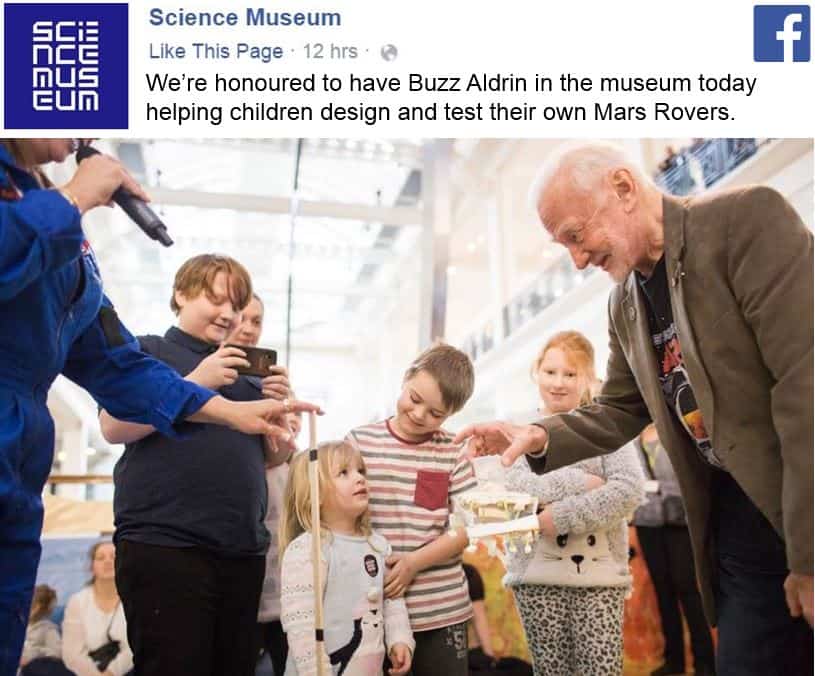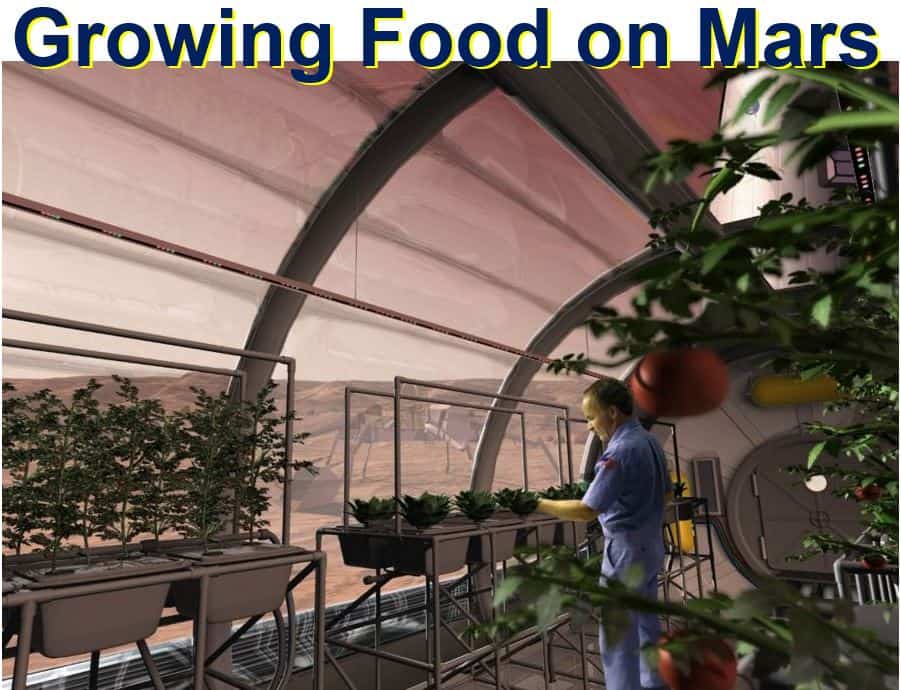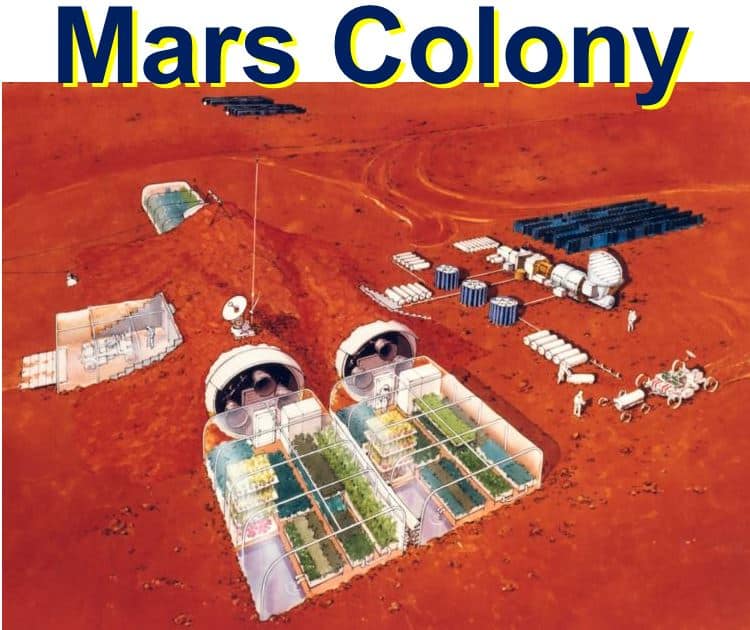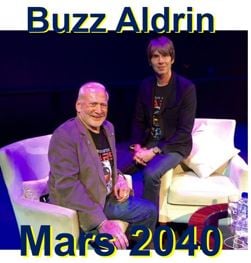Getting to Mars by 2040 will be the easy part, but feeding ourselves there will be much harder, said Buzz Aldrin – the second man to walk on the Moon – at the Science Museum in London. He said his was the generation of Moonwalkers, while the millennials are the future Marswalkers.
Millennials are people born from the 1980s to about the year 2000.
Dr. Aldrin, 86, the Lunar Module Pilot on Apollo 11 in 1969, the first manned Lunar Landing in history, explained that although the Red Planet may be about 250 million miles away, getting there will be the easy part.
 Dr. Aldrin tweeted the following message with the photo above: “Me & @ProfBrianCox are almost ready for liftoff! @sciencemuseum #DestinationMars.” (Image: twitter.com/TheRealBuzz)
Dr. Aldrin tweeted the following message with the photo above: “Me & @ProfBrianCox are almost ready for liftoff! @sciencemuseum #DestinationMars.” (Image: twitter.com/TheRealBuzz)
It will require international collaboration
Humans could touch down on Mars by 2040 as a result of international cooperation and large companies working together. We should also be able to set up a human colony there.
For a Mars colony, we would need people willing to leave Earth for very long periods. The Mars base would eventually have to become self-sufficient. Dr. Aldrin believes the Moon may have to be used as a possible staging post.
For the whole project to work properly and over the long-term, there would need to be a constant cyclical transportation to get supplies and people from our planet to Mars.
In an interview at the Museum with Professor Brian Cox, Dr. Aldrin said “We’ll become great when nations collaborate to fly to Mars and beyond.”
 For these children, to talk to Buzz Aldrin, a real astronaut who has even walked on the Moon, was an experience they will never forget. (Image: facebook.com/sciencemuseumlondon)
For these children, to talk to Buzz Aldrin, a real astronaut who has even walked on the Moon, was an experience they will never forget. (Image: facebook.com/sciencemuseumlondon)
Sustaining ourselves will be the hard part
Referring to travelling to the Red Planet, Dr. Aldrin added:
“That is the easy part. We know how to do that, we know how to get people there. It is being able to sustain yourself. [A Mars mission] is very realistic, in my mind.”
If we were to focus our attention just on getting humans on the Moon and setting up a base there, we would be regressing half a century, to when he and fellow astronaut Neil Armstrong first set foot on the Moon in 1969.
However, a journey to Mars and establishing a colony there would be an enormous leap forward, which is what humans like to do.
Dr. Aldrin said:
“I look at where we were 47 years ago leading the world in space exploration, having six landings on the moon, no one has done anything like that ever since.”
“To take the step [to Mars], to take the movement, to take the action to begin to occupy. Is there anything bigger that humans could do on Earth than to leave and begin to occupy?”
 According to NASA: “One of the greatest challenges [for a Mars mission] is in-situ resources. Mining resources to make oxygen, nitrogen, methane as well as the growth of a self-sufficient food supply is critical to make this journey safer and more cost effective.” (Image: nasa.gov)
According to NASA: “One of the greatest challenges [for a Mars mission] is in-situ resources. Mining resources to make oxygen, nitrogen, methane as well as the growth of a self-sufficient food supply is critical to make this journey safer and more cost effective.” (Image: nasa.gov)
Colonisers would initially need help from Earth
It would not be possible simply to send people to Mars and tell them they were on their own, it would also be wrong, he added.
He said researchers currently estimate that people on Mars would only be able to produce about one fifth of their food requirements. The rest would have to come from Earth.
If we just sent people to Mars and brought them back after a short stay, there would be little to be gained, he explained – it would be a colossal expense for very little return. It would be far more worthwhile if we managed to set up some bases which could be visited by an ever-growing number of people.
 An artist’s concept of living quarters on Mars covered with soil to shield the settlers from the Sun’s radiation. The base also has a greenhous and pressurized work facility where humans will be able to walk about without spacesuits. (Image: nasa.gov. Credit: CASE FOR MARS)
An artist’s concept of living quarters on Mars covered with soil to shield the settlers from the Sun’s radiation. The base also has a greenhous and pressurized work facility where humans will be able to walk about without spacesuits. (Image: nasa.gov. Credit: CASE FOR MARS)
Dr. Aldrin said:
“I feel that we need to concentrate our efforts on one major base (on Mars), to make that as close to being self-sufficient.”
“If we try and be at many places the scientists may be happy but we’ll have to bring people back, as we haven’t built up a self-sustaining system and when people start to stay they will still need to be supplied [with food and other things from Earth].”
“We have to acknowledge that they can’t grow everything they need. We are doing a lot of research on how to use the water that we can find there and the soil to grow from seeds enough to feed the people who are there.”
“I don’t think that you just put people there and that’s it, you want to be building that up, and in order to do that you have to keep supplying more and more people and learning here how we can create the conditions on Mars to learn how to provide the people there with the means, whether it’s some kind of fertiliser that we can discover and find some of it there.”
 Eminent theoretical physicist and astronomer Prof. Stephen Hawking believes the only way we can guarantee the survival of our species is by colonising other planets. (Image: hawking.org.uk)
Eminent theoretical physicist and astronomer Prof. Stephen Hawking believes the only way we can guarantee the survival of our species is by colonising other planets. (Image: hawking.org.uk)
Risk of mental problems for Mars pioneers
He thinks the mental toll of such a voyage would be considerable. People would be leaving Earth and spending very long periods on another planet – for some of them it could be a one-way trip (rest of their lives).
Dr. Aldrin thinks there are plenty of people willing to make that decision. However, he also believes the risk of people regretting having made that commitment later on could be high, with subsequent effects on their performance and their ability to achieve a successful mission.
He said he could imagine several hundred people on the Red Planet, and that population gradually increasing.
The whole project would require a stable and prosperous global economy, strong collaboration between nations and businesses, and peace on Earth. Economic recessions and wars would be major obstacles.
We need collaboration not a space race
Dr. Aldrin said:
“It is very difficult for one nation to do everything, even at the moon, and a plan that brings people together and builds things at the moon that can be used at Mars, that becomes very, very helpful. For the US, we have already been to the moon, so to start off where we left off would be wasteful.”
“We should build on that and move ahead and not compete with other nations, especially China, but help them join all the rest. I am very optimistic, we just need to get Europe and Japan enthusiastic about going to the moon.”
For today’s children and teenagers to be future Mars colonisers, plans need to be put in place now – we need a starting point – he insisted.
In 2019 it will have been half-a-century since humans first set foot on the Moon – 21st July, 1969.
Regarding the 50th anniversary of the first Lunar Landing, Dr. Aldrin said:
“I think we need a starting point, and in about two years or so it will be 50 years since we landed on the moon. That is a time to celebrate, sort of – we can look back and see where we’ve been, where we are, and where we should go.”
Video – Buzz Aldrin chats with Brian Cox
This special talk was recorded at the Science Museum’s IMAX Theatre between astronaut Buzz Aldrin, the second man to set foot on the Moon, and British physicist Brian Cox.

